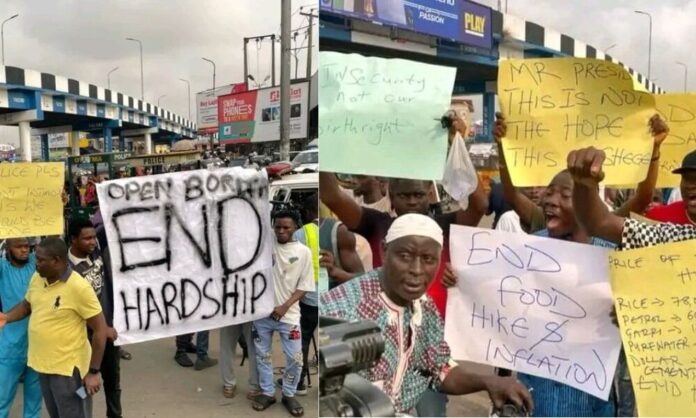The CSOs said attempts to suppress protests through intimidation, excessive use of force, or unjust legal actions are unacceptable and counterproductive.
By Jeffrey Agbo
No fewer than 36 civil society organisations (CSOs) have expressed support for the nationwide protests set to kick off on August 1.
In a statement on Monday, they affirmed that protesting is a legitimate form of expression but cautioned that it should be done peacefully without infringing on others’ rights.
“In light of recent events and ongoing discussions surrounding the appropriateness of citizens expressing their dissatisfaction with government policies and actions, we, the undersigned civil society organisations, are compelled to reaffirm the fundamental right of citizens to peaceful protest as a fundamental pillar of democratic governance,” the statement said.
“This right is a cornerstone of any democratic society and a critical means for citizens to express their dissatisfaction, demand accountability, and advocate for change.
“Protesting is a legitimate form of expression enshrined in international human rights instruments, including the Universal Declaration of Human Rights (UDHR), the International Covenant on Civil and Political Rights, the African Charter on Human and Peoples’ Rights, and Nigeria’s 1999 Constitution (as amended), among others. It allows citizens to publicly voice their concerns, challenge injustices, and participate actively in the democratic process.
“Protests serve as a vital mechanism for holding leaders accountable and ensuring that government actions reflect the will and needs of the people. History has shown that protests can lead to significant changes in government policies, processes and practices, highlighting the power of collective action to address grievances and promote good governance.
“While the right to protest is a fundamental principle of democratic nations, we concede that it must be exercised peacefully and responsibly without violating the rights of others. Accordingly, we urge all parties engaged, including protest organisers, participants, and law enforcement agencies, to prioritise safety and the rule of law. Law enforcement has a duty to safeguard protesters while upholding public order. Demonstrators must avoid activities that might exacerbate tensions, cause unrest or threaten public safety.”
The CSOs said attempts to suppress protests through intimidation, excessive use of force, or unjust legal actions are unacceptable and counterproductive.
“Every protest is deemed peaceful, and if intelligence indicates otherwise, it is the role of the appropriate government agencies to identify such saboteurs and arrest them immediately. Arresting protest organisers shows a lack of understanding of the enemies of the state.
“We urge the Nigerian Judiciary and the National Human Rights Commission (NHRC) to uphold the rights of all protesters and establish a mechanism to promptly address and dismiss oppressive charges that may arise from these protests.
“The demands include reducing the cost of living, curbing insecurity, reducing the cost of governance, electoral reform, judicial reform, and constitutional reform, which are all recurring themes in Nigeria’s journey towards a healthy democracy.
“We reaffirm our commitment to the principles of democracy and human rights and stand in solidarity with those who decided to exercise the right to peaceful protest.
READ ALSO:
Tinubu insists August nationwide protest is unnecessarily
“We encourage all citizens to actively participate in shaping a just and accountable society, and we call on all stakeholders to uphold the principles of democracy, human rights, and the rule of law,” they said.
The CSOs who signed the statement are 21st Century Community Empowerment for Youth and Women Initiative; Accountability Lab Nigeria; Africa Institute for Energy Governance (AFIEGO) Uganda; BudgIT Foundation; Centre for Accountability and Inclusive Development (CAAID); Centre for Inclusive Social Development (CISD); Centre for Journalism Innovation and Development (CJID); Civil Society Legislative Advocacy Centre (CISLAC); Dataphyte Foundation; DigiCivic Initiative; Enough is Enough (EiE) Nigeria; and Farnnel Women Foundation.
They also include Gee Foundation for Social Justice and Development; Global Rights; Health Education and Human Rights Advocacy Initiative (HEHRAI); HIFWAC Relief; Hope Behind Bars Africa; Institutional and Sustainable Development Foundation ( ISDF); International Peace and Civic Responsibility Centre (IPCRC); International Press Centre (IPC); Invictus Africa; Kilimanjaro Youth Foundation; Media Rights Agenda (MRA); and Mothers United and Mobilised.
The rest are Nigeria Network of NGOs; Paradigm Initiative (PIN); Policy Alert; Public and Private Development Centre (PPDC); Research Centre for Development Action; Rule of Law and Accountability Advocacy Centre (RULAAC); Sesor Empowerment Foundation; TechHer NG; The Meluibe Empowerment Foundation; We the People; WikkiTimes; and Yiaga Africa.













